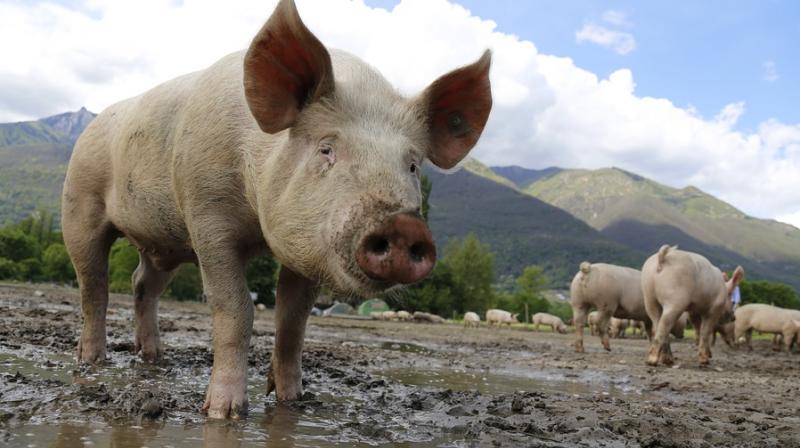China pig cull tops 20,000 as African swine fever deepens farm crisis
China's first reported outbreaks of ASF have stoked concerns about its spread and potential damage to demand for pork.

BEIJING: China’s pig cull topped 20,000 animals on Wednesday as officials try to halt an outbreak of deadly African swine fever (ASF) in the world’s largest pig market, already reeling from a year-long price rout.
Nearly 15,000 hogs have been culled in Lianyungang city in eastern Jiangsu province as of Aug. 20, local authorities said, after the third case of the highly contagious disease was found at the weekend, the third in two weeks.
China’s first reported outbreaks of ASF - a disease for which there is no vaccine - have stoked concerns about its spread and potential damage to demand for pork, a staple of the nation’s diet.
National hog prices, which had been recovering from four-year lows struck in May, hit a three-week low at 13.71 yuan ($1.99) a kilogram on Wednesday and are down 7.2 percent year-on year, according to consultancy China-America Commodity Data Analytics.
The price fall has added to financial pain for farmers who have been left struggling after a rapid expansion of capacity led to oversupply and sinking prices. At the same time, the U.S.-China trade row has pushed up the cost of livestock feed. “Everyone is panicking,” said Xie Yingqiang, who has a farm just 40 km (25 miles) from the latest case in Lianyungang. “If your pigs get it, there is nothing you can do.”
Farmers have started to sell pigs for slaughter, worried that the disease will hit their herds and that prices will fall further, said Yao Guiling, analyst with China-America Commodity Data Analytics. “Purchasing demand has dropped, and demand from end users remains quite weak,” said Yao. “Pig farmers panicked because of the outbreaks and were more motivated to send their pigs to the slaughterhouse, pushing down prices.”
ASF is one of the most devastating diseases to affect swine herds. It occurs among pigs and wild boars, transmitted by ticks and direct contact between animals. It does not affect humans.
DEFENSE MEASURES
With no vaccine available, nervous farmers have been taking their own measures to protect herds, from ramping up sterilization of pens, to adding nutrition and anti-virus drugs in feed, and curbing the movement of pigs and staff in and out of farms.
China is home to about 500 million pigs, with tens of thousands of backyard and large-scale farms in the northern, central and southern regions. It produces about half of the world’s pork and is the top consumer of the meat. “The situation is very severe now and the whole industry is scared,” said Zheng Peikun, another pig farmer in China’s southwestern Guizhou with over 20,000 pigs.
Zheng has added anti-virus medicine in his pig feed, in the hope that it can help increase the hogs’ immunity. “It is like a war. Except this time you can only try and defend against it,” he said. Xie, in Jiangsu, used to clean his pens once a month, but he is now disinfecting them every three days.
Chinese authorities have sealed off areas where the three ASF outbreaks were confirmed, and have banned movement of pigs and products in and out of the infected regions.
They have also stepped up inspections of pigs being transported in and out of the affected provinces, according to four farmers and two analysts.
Some farmers called for a total ban of long-distance transportation of live pigs. “If it gets out of control, it will be a catastrophe to the whole pig industry, “ said Zheng.

